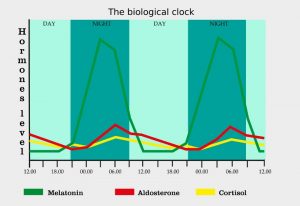New research into the effects of working during the night has found that shift work harms nurses in a number of ways, affecting not only their own well-being but also their ability to care for their patients.
Night Shift Work Harms Nurses By Inhibiting the Circadian Rhythm
Researchers at the University of Alabama conducted a recent study to determine how shift work affects female nurses. The study included a group of night shift nurses and a group of nurses assigned to day shifts to see how the different work schedules affected the health and performance of the nurses.
 Over the nine-day period, researchers evaluated the core body temperatures of all of the nurses, as well as their locomotor activity functioning. Additionally, melatonin and cortisol levels were measured. Cortisol is a stress hormone, while melatonin is the hormone used by the body to regulate wakefulness and sleepiness.
Over the nine-day period, researchers evaluated the core body temperatures of all of the nurses, as well as their locomotor activity functioning. Additionally, melatonin and cortisol levels were measured. Cortisol is a stress hormone, while melatonin is the hormone used by the body to regulate wakefulness and sleepiness.
Upon evaluating the data, the research team found that the core body temperature, locomotor activity, cortisol and melatonin levels were all affected in the night shift nurses. As a whole, these findings suggested that the circadian rhythm was adversely affected when the regular nighttime sleeping patterns of the night shift nurses, which they resumed on their days off, were disrupted. Since day shift and night shift nurses followed similar lifestyle patterns on their days off, the disruption in the circadian rhythm exhibited in the night shift nurses recurred each week.
This is important because the circadian rhythm influences a number of biological functions, including hormone distribution. When the circadian rhythm is disrupted, the individual’s ability to stay awake and alert may be compromised. The opposite is also true: A disrupted circadian rhythm can cause sleep difficulties as night shift nurses try to get rest during the daylight hours.
More Adverse Health Effects Resulting from Night Shift Work
A disrupted circadian rhythm may also play a larger role in affecting one’s health. People who do night shift work have shown an increased likelihood of developing a variety of medical conditions, including becoming more apt to contract certain types of cancer. Heart disease, gastrointestinal problems and ulcers, obesity and metabolic issues are all also common among those who work night-shift schedules.
These increased health risks may have something to do with the higher triglyceride levels night shift employees exhibit in comparison to their day-shift counterparts. High triglyceride levels are partly to blame for high blood pressure, high blood glucose levels and excess gut fat. The poorer diets consumed by most night shift workers only serve to compound these health risks.
There has also been research that links exposure to artificial light in the late night hours to a higher risk of developing breast cancer. In a 2012 study, as many as 4.5 percent of breast cancer terminal diagnoses were linked to night shift work and the exposure to late-night light. Additional research suggested the risks were even higher for women who worked rotating overnight shifts or alternating 12-hour shifts. The risks of developing breast cancer for female nurses working irregular shifts increased when they remained on these schedules for four to five years or more.
Some studies have found that emotional health is also affected by late-night shift work. Women who work overnight shifts are more likely to develop depression than day-shift nurses, suggesting night-shift work harms nurses psychologically. Due to their irregular schedules, night-shift nurses tend to be less social than day-shift nurses as well. This can lead to feelings of isolation, which may promote more severe depressive episodes. Working an overnight schedule is more likely to cause female nurses to feel disconnected from their loved ones, boosting their risk of losing touch with friends, partners and their children.
Night Shift Work Increases the Likelihood of Nursing Errors
In addition to the physical and emotional health hazards that shift work poses, another recent study found that the quality of work suffered in night-shift workers. Nurses working night shifts were found to make errors in administering medications more frequently than day-shift workers. A disrupted circadian rhythm can leave night shift nurses feeling fatigued and anxious, as well as inducing more frequent depressive episodes. These negative emotions can be distracting, causing overnight nurses to commit errors more frequently.

The rates of both depression and the medication errors were higher among nurses who worked irregular shifts. Nurses who worked at least four night shifts per week were at the highest risks for committing medication errors, and for suffering from depression. The researchers additionally found correlations that suggested nurses who took sleep medication to compensate for their irregular shift work were more prone to experience general fatigue and depression. Since depression and fatigue were strongly linked to medication errors on the job, the researchers concluded that sleep medications exacerbated the problem.
Better Support for Nurses
The comprehensive results of these recent studies indicate that the scheduling of nurses must be re-evaluated. When hospitals can find ways to provide better opportunities for quality sleep and allow their nurses to work more regular hours, the health and performance of their nurses will improve. Since the importance the circadian rhythm plays in physical and mental health cannot be understated, helping nurses maintain a proper balance will keep them healthier, happier and more alert.







